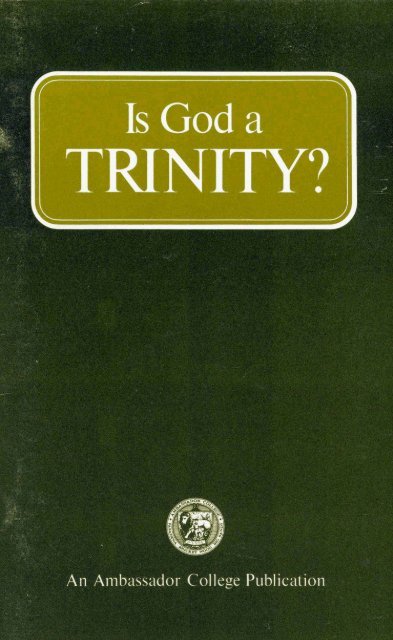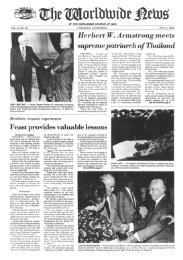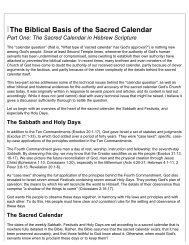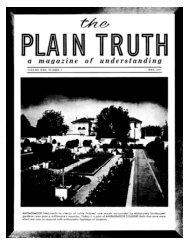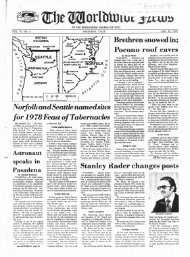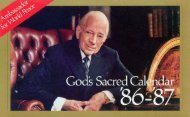Is God a Trinity - Herbert W. Armstrong Library and Archives
Is God a Trinity - Herbert W. Armstrong Library and Archives
Is God a Trinity - Herbert W. Armstrong Library and Archives
Create successful ePaper yourself
Turn your PDF publications into a flip-book with our unique Google optimized e-Paper software.
<strong>Is</strong> <strong>God</strong> a 1<br />
TRINITY?<br />
An Ambassador College Publication
<strong>Is</strong> <strong>God</strong> a<br />
TRINITY?<br />
by George L. Johnson<br />
Ambassador College Press<br />
Pasadena, California
This booklet is not to be sold.<br />
It is a free educational service in<br />
the public interest, published by<br />
Ambassador College.<br />
@ 1973 Ambassador College<br />
All Rights Reserved<br />
Printed in U.S.A.
<strong>Is</strong> <strong>God</strong> a <strong>Trinity</strong> or a family?<br />
Was Jesus Christ <strong>God</strong>, or<br />
merely a man? Was Jesus the<br />
born son of <strong>God</strong>, or only an<br />
adopted son? <strong>Is</strong> the Holy Spirit<br />
a person or the creative power<br />
of the <strong>God</strong>head? These questions<br />
about the nature of <strong>God</strong><br />
are answered in this booklet.
<strong>Is</strong> the<br />
<strong>Trinity</strong><br />
CHAPTER ONE<br />
id?<br />
HE belief that <strong>God</strong> is one substance, yet three persons,<br />
is one of the central doctrines of the Christian<br />
T religion. The concept of the <strong>Trinity</strong> is believed by<br />
most professing Christians, whether Catholic or Protestant.<br />
A Gallup Poll taken in 1966 found that 97% of the<br />
American public believed in <strong>God</strong>. Of that number, 83%<br />
believed that <strong>God</strong> is a <strong>Trinity</strong>.<br />
Yet for all this belief in the <strong>Trinity</strong>, it is a doctrine<br />
that is not clearly understood by most Christian laymen.<br />
In fact, most have neither the desire nor the incentive to<br />
underst<strong>and</strong> what their church teaches. Few laymen are<br />
aware of any problems with the doctrine of the <strong>Trinity</strong>.<br />
They simply take it for granted - leaving the mysterious<br />
doctrinal aspects to theologians.<br />
And if the layman were to investigate further, he<br />
would be confronted with discouraging statements similar<br />
to the following: “The mind of man cannot fully underst<strong>and</strong><br />
the mystery of the <strong>Trinity</strong>. He who would try to<br />
underst<strong>and</strong> the mystery fully will lose his mind. But he<br />
who would deny the <strong>Trinity</strong> will lose his soul” (Harold<br />
Lindsell <strong>and</strong> Charles J. Woodbridge, A H<strong>and</strong>book of<br />
Christian Truth, pp. 51-52).<br />
Such a statement means that the concept of the <strong>Trinity</strong><br />
should be accepted or else. But, merely to accept it as<br />
doctrine without proving it would be totally contrary to
8 <strong>Is</strong> <strong>God</strong> a <strong>Trinity</strong>?<br />
I<br />
I<br />
Scripture. <strong>God</strong> inspired Paul to write: “Prove all things;<br />
hold fast that which is good” (I Thes. 5:21).<br />
Peter further admonished Christians: “. . . Be ready<br />
always to give an answer to every man that asketh you a<br />
reason of the hope that is in you.. .” (I Peter 3:15).<br />
Therefore the Christian is duty bound to prove<br />
whether or not <strong>God</strong> is a <strong>Trinity</strong>.<br />
Clear Explanation Difficult<br />
If you were to confine yourself to reading the articles<br />
on the <strong>Trinity</strong> in popular religious literature for laymen,<br />
you would conclude that the <strong>Trinity</strong> is everywhere <strong>and</strong><br />
clearly taught in the Bible. However, if you were to begin<br />
to read what the more technical Bible encyclopedias, dictionaries<br />
<strong>and</strong> books say on the subject, you would come to<br />
an entirely different conclusion. And the more you studied,<br />
the more you would find that the <strong>Trinity</strong> is built on a<br />
very shaky foundation indeed.<br />
The problems inherent in clearly explaining the <strong>Trinity</strong><br />
are expressed in nearly every technical article or book<br />
on the subject.<br />
The New Catholic Encyclopedia begins: “It is difficult,<br />
in the second half of the 20th century, to offer a clear,<br />
objective, <strong>and</strong> straightforward account of the revelation,<br />
doctrinal evolution, <strong>and</strong> the theological elaboration of the<br />
mystery of the <strong>Trinity</strong>. Trinitarian discussion, Roman<br />
Catholic as well as other, presents a somewhat unsteady<br />
silhouette” (Vol. XIV, p. 295). (Emphasis ours throughout<br />
booklet.)<br />
But why should the central doctrine of the Christian<br />
faith be so difficult to underst<strong>and</strong>? Why should such an<br />
important doctrine present an unsteady silhouette? <strong>Is</strong>n’t<br />
there a clear biblical revelation of the doctrine of the<br />
<strong>Trinity</strong>? Didn’t Christ <strong>and</strong> the apostles plainly teach it?<br />
Surely the Bible would be filled with teachings about<br />
such an important subject as the <strong>Trinity</strong>. But, unfortunately<br />
the word “<strong>Trinity</strong>” never appears in the Bible.<br />
‘The term ‘<strong>Trinity</strong>’ is not a Biblical term, <strong>and</strong> we are<br />
not using Biblical language when we define what is
<strong>Is</strong> the <strong>Trinity</strong> Biblical? 9<br />
expressed by it as the doctrine” (The International St<strong>and</strong>ard<br />
Bible Encyclopedia, article “<strong>Trinity</strong>,” p. 3012).<br />
Not only is the word “<strong>Trinity</strong>” never found in the<br />
Bible, there is no substantive proof such a doctrine is even<br />
indicated.<br />
In a recent book on the <strong>Trinity</strong>, Catholic theologian<br />
Karl Rahner recognizes that theologians in the past have<br />
been “. . . embarrassed by the simple fact that in reality<br />
the Scriptures do not explicitly present a doctrine of the<br />
‘imminent’ <strong>Trinity</strong> (even John’s prologue is no such doctrine)”<br />
(The <strong>Trinity</strong>, p. 22). (Author’s emphasis.)<br />
Other theologians also recognize the fact that the first<br />
chapter of John’s Gospel - the prologue - clearly shows<br />
the pre-existence <strong>and</strong> divinity of Christ <strong>and</strong> does not teach<br />
the doctrine of the <strong>Trinity</strong>. After discussing John’s prologue,<br />
Dr. William Newton Clarke writes: “There is no<br />
<strong>Trinity</strong> in this; but there is a distinction in the <strong>God</strong>head, a<br />
duality in <strong>God</strong>. This distinction or duality is used as basis<br />
for the idea of an only-begotten Son, <strong>and</strong> as key to the<br />
possibility of an incarnation” (Outline of Christian Theology,<br />
P. 167).<br />
The first chapter of John’s Gospel clearly shows the<br />
pre-existence of Christ. It also illustrates the duality of<br />
<strong>God</strong>. And as Dr. Clarke points out, the key to the possibility<br />
of the incarnation - the fact that <strong>God</strong> could become<br />
man.<br />
The Apostle John makes plain the unmistakable fact<br />
that Jesus Christ is <strong>God</strong> (John 1:l-4). Yet we find no<br />
<strong>Trinity</strong> discussed in this chapter.<br />
More Biblical ”Proof” for the <strong>Trinity</strong>?<br />
Probably the most notorious scripture used in times<br />
past as “proof” of a <strong>Trinity</strong> is I John 5:7. However, many<br />
theologians recognize that this scripture was added to the<br />
New Testament manuscripts probably as late as the<br />
eighth century A.D.<br />
Notice what Jamieson, Fausset <strong>and</strong> Brown wrote in<br />
their commentary: “The only Greek MSS. [manuscripts],<br />
in any form which support the words, ‘in heaven, the<br />
Father, the Word, <strong>and</strong> the Holy Ghost: <strong>and</strong> these three are
10 <strong>Is</strong> <strong>God</strong> a <strong>Trinity</strong>?<br />
one. And there are three that bear witness in earth. . .’ are<br />
the Montfortianus of Dublin, copied evidently from the<br />
modern Latin Vulgate; the Ravianus copied from the<br />
Complutensian Polyglot; a MS. [manuscript] at Naples,<br />
with the words added in the margin by a recent h<strong>and</strong>;<br />
Ottobonianus, 298, of the fifteenth century, the Greek of<br />
which is a mere translation of the accompanying Latin.<br />
All old versions omit the words.’’<br />
The conclusions arrived at in their commentary, written<br />
over 100 years ago, are still valid today. More conservatively<br />
oriented The New Bible Commentary<br />
(Revised) agrees, though “quietly” with Jamieson, Fausset<br />
<strong>and</strong> Brown. “. . . The words are clearly a gloss <strong>and</strong> are<br />
rightly excluded by RSV [Revised St<strong>and</strong>ard Version] even<br />
from its margin” (p. 1269).<br />
The editors of Peake’s Commentary on the Bible wax<br />
more eloquent in their belief that the words are not part of<br />
the original text. “The famous interpolation after ‘three<br />
witnesses’ is not printed even in RSV, <strong>and</strong> rightly. It cites<br />
the heavenly testimony of the Father, the logos, <strong>and</strong> the<br />
Holy Spirit, but is never used in the early trinitarian<br />
controversies. No respectable Greek MS contains it.<br />
Appearing first in a late 4th century Latin text, it entered<br />
the Vulgate <strong>and</strong> finally the NT [New Testament] of<br />
Erasmus” (p. 1038).<br />
Scholars clearly recognize that I John 5:7 is not part<br />
of the New Testament text. Yet it is still included by some<br />
fundamentalists as biblical proof for the <strong>Trinity</strong> doctrine.<br />
Even the majority of the more recent New Testament<br />
translations do not contain the above words. They are not<br />
found in Moffatt, Phillips, the Revised St<strong>and</strong>ard Version,<br />
Williams, or The Living Bible (a paraphrase).<br />
It is clear, then, that these words are not part of the<br />
inspired canon, but rather were added by a “recent h<strong>and</strong>.”<br />
The two verses in I John should read: “For there are three<br />
that bear record, the Spirit, <strong>and</strong> the water <strong>and</strong> the blood:<br />
<strong>and</strong> these three agree in one.”<br />
Three things bear record. But what do they bear<br />
record to? A <strong>Trinity</strong>? We shall see.
<strong>Is</strong> the Tlinity Biblical? 11<br />
Bear Record to What?<br />
The Spirit, the water <strong>and</strong> the blood bear record of the<br />
fact that Jesus Christ, the Son of <strong>God</strong>, is living His life<br />
over again in us. John clarifies it in verses 11-12:<br />
“And this is the record, that <strong>God</strong> hath given to us<br />
eternal life, <strong>and</strong> this life is in his Son. He that hath the Son<br />
hath life; <strong>and</strong> he that hath not the Son of <strong>God</strong> hath not<br />
life.”<br />
But how do these three elements - the Spirit, the<br />
water, <strong>and</strong> the blood - specifically bear witness to this<br />
basic biblical truth?<br />
“The Spirit beareth witness with our spirit, that we<br />
are the children of <strong>God</strong>” (Rom. 8:16). (We will see more<br />
about the part the Spirit plays in Chapter Three.)<br />
Water is representative of baptism, which bears witness<br />
of the burial of the old self <strong>and</strong> the beginning of a new<br />
life (Rom. 6:l-6).<br />
The blood represents Christ’s death by crucifixion,<br />
which pays the penalty for our sins, reconciling us to <strong>God</strong><br />
(Rom. 59, 10).<br />
Now underst<strong>and</strong> why Christ comm<strong>and</strong>ed the apostles<br />
to baptize in the name of the Father, the Son <strong>and</strong> the Holy<br />
Spirit (Matt. 28:19). First of all, Jesus did not comm<strong>and</strong><br />
the apostles to baptize in the name of the Father, the Son<br />
<strong>and</strong> the Spirit as an indication that <strong>God</strong> is a <strong>Trinity</strong>. No<br />
such relationship is indicated in the Bible.<br />
Why, then, were they to baptize using these three<br />
names? The answer is clear.<br />
They were to baptize in the name of the Father<br />
because it is the goodness of <strong>God</strong> that brings us to repentance<br />
(Rom. 2:4), <strong>and</strong> because the Father is the One “of<br />
whom the whole family in heaven <strong>and</strong> earth is named”<br />
(Eph. 3:15). In the name of the Son because He is the one<br />
who died for our sins, <strong>and</strong> in the name of the Spirit<br />
because <strong>God</strong> sends His Spirit, making us His begotten<br />
Sons (Rom. 8:16).<br />
Many theologians have misunderstood the part that<br />
the Father, the Son <strong>and</strong> the Holy Spirit play in each<br />
(Continued on page 15)
The central doctrine of most Protestant <strong>and</strong><br />
Catholic churches for many centuries has been that<br />
of the <strong>Trinity</strong>. This doctrine is so important that the<br />
Catholic Encyclopedia states : ' 'T h is [the Tri n it y] ,<br />
the Church teaches, is the revelation regarding<br />
<strong>God</strong>'s nature which Jesus Christ, the Son of <strong>God</strong>,<br />
came upon earth to deliver to the world: <strong>and</strong> which<br />
she [the Catholic Church] proposes to man as the<br />
foundation of the whole dogmatic system. "<br />
Both Catholic <strong>and</strong> Protestant theologians quote<br />
Theophilus of Antioch (circa 180 A.D.) as the first<br />
person to write about this most important doctrine.<br />
But isn't it strange that such a major doctrine was<br />
avoided in religious writings for nearly two centuries?<br />
That is almost as long as the United States<br />
has been a nation.<br />
Furthermore, Theophilus' allusion to the traditional<br />
<strong>Trinity</strong> - "the Father, the Son <strong>and</strong> the Holy
4<br />
Ghost" - is quite nebulous at best. Notice what<br />
Theophilus wrote in commenting about the fourth<br />
day of creation in the first chapter of Genesis:<br />
"And as the sun remains ever full, never becoming<br />
less, so does <strong>God</strong> always abide perfect, being full<br />
of all power, <strong>and</strong> underst<strong>and</strong>ing, <strong>and</strong> wisdom, <strong>and</strong><br />
immortality, <strong>and</strong> all good. But the moon wanes<br />
monthly, <strong>and</strong> in a manner dies, being a type of<br />
man; then it is born again, <strong>and</strong> is crescent, for a<br />
pattern of the future resurrection. In like manner<br />
also the three days which were before the luminaries,<br />
are types of the trinity, of <strong>God</strong>, <strong>and</strong> His<br />
Word, <strong>and</strong> His wisdom" (Ante-Nicene Fathers,<br />
' ' T h eo p h i I us to Auto I y cu s ' ') .<br />
Here is the first statement by a theologian that is<br />
supposed to teach the doctrine of the <strong>Trinity</strong>. But<br />
does his statement really teach this?<br />
Read it - simply. He does not say that <strong>God</strong> is a<br />
<strong>Trinity</strong> of persons, or that the Holy Spirit is a part<br />
of that <strong>Trinity</strong>. He just refers to <strong>God</strong>, His Word <strong>and</strong><br />
His wisdom.<br />
Theologians have tried to imagine into this<br />
unusual statement "their <strong>Trinity</strong>" - <strong>and</strong> yet even<br />
the editors of the Ante-Nicene Fathers state in a<br />
footnote that the word translated "wisdom" in<br />
English is the Greek word sophia which Theophilus<br />
elsewhere used in reference to the Son, not the<br />
Holy Spirit. (Continued on next page)
Theophilus could not possibly have gotten the<br />
idea of a <strong>Trinity</strong> from the Bible - if he really did<br />
have a <strong>Trinity</strong> of persons in mind, which appears<br />
unlikely from the preceding statement - as the<br />
Bible nowhere even alludes to <strong>God</strong> being a <strong>Trinity</strong>.<br />
From the time of Theophilus, it was several hundred<br />
years before this doctrine became a part of<br />
the Catholic dogma. It was in the last twenty-five<br />
years of the FOURTH century that "what might be<br />
called the definitive trinitarian dogma 'one <strong>God</strong> in<br />
three persons' became thoroughly assimilated into<br />
Christian life <strong>and</strong> thought" (New Catholic Encyclopedia,<br />
'' H 01 y T ri n i ty '') .<br />
From this it is evident that this "central doctrine"<br />
of Catholicism <strong>and</strong> Protestantism was not a<br />
part of the "faith which was once delivered<br />
unto the saints" (Jude 3) during or prior to the<br />
time of Jude, but was added by later<br />
theologians.<br />
The doctrine of the <strong>Trinity</strong> was not what Jesus<br />
Christ "came upon the earth to deliver to the<br />
world." He came to preach the good news of His<br />
soon-coming Kingdom, to establish His true<br />
Church, to give His life as a sacrifice for all who<br />
repent, <strong>and</strong> to give <strong>God</strong>'s Holy Spirit to those who<br />
are baptized - the Spirit that empowers believers<br />
to be ONE with the Father <strong>and</strong> the Son.
<strong>Is</strong> the <strong>Trinity</strong> Biblical? 15<br />
I<br />
i<br />
e<br />
*<br />
(Continued from page 11)<br />
person’s salvation. The doctrine of the <strong>Trinity</strong> is the result<br />
of that misunderst<strong>and</strong>ing.<br />
The <strong>Trinity</strong> is not a biblical doctrine. It has no basis<br />
in biblical fact. Then how did this doctrine come to be<br />
believed by the Church?<br />
History of the <strong>Trinity</strong><br />
The ancient idea of monotheism was shattered by the<br />
sudden appearance of Jesus Christ on the earth. Here was<br />
someone who claimed He was the Son of <strong>God</strong>. But how<br />
could He be? The Jewish people believed for centuries that<br />
there was only one <strong>God</strong>. If the claims of “this Jesus” were<br />
accepted, then in their minds their belief would be no<br />
different from that of the polytheistic pagans around<br />
them. If He were the Son of <strong>God</strong>, their whole system of<br />
monotheism would disintegrate.<br />
When Jesus plainly told certain Jews of His day that<br />
He was the Son of <strong>God</strong>, some were ready to stone Him for<br />
blasphemy (John 10:33).<br />
To get around the problem of a plurality in the <strong>God</strong>head,<br />
the Jewish community simply rejected Jesus. And to<br />
this day, Orthodox Jews will not accept Jesus’ Messiahship.<br />
However, the more liberal Jews will at least admit<br />
that He was a great man - maybe even a prophet.<br />
But the “new” Christian religion was still faced with<br />
the problem. How would proponents explain that there<br />
was only one <strong>God</strong>, not two?<br />
“The determining impulse to the formulation of the<br />
doctrine of the <strong>Trinity</strong> in the church was the church’s<br />
profound conviction of the absolute Deity of Christ, on<br />
which as on a pivot the whole Christian concept of <strong>God</strong><br />
from the first origin of Christianity turned” (International<br />
St<strong>and</strong>ard Biblical Encyclopedia, article “<strong>Trinity</strong>,” p.<br />
3021).<br />
But the Deity of Christ does not mean that a doctrine<br />
of the <strong>Trinity</strong> is necessary, as we shall see in Chapter Two.<br />
Roots in Greek Philosophy<br />
Many of the early church fathers were thoroughly<br />
educated in Greek philosophy, from which they borrowed
<strong>Is</strong> the <strong>Trinity</strong> Biblical? 17<br />
I<br />
such non-biblical concepts as dualism <strong>and</strong> the immortality<br />
of the soul. However, most theologians, for obvious reasons,<br />
are generally careful to point out that they did not<br />
borrow the idea of the <strong>Trinity</strong> from the Triads of Greek<br />
philosophy or those of the ancient Egyptians <strong>and</strong> Babylonians.<br />
But some are not so careful to make such a distinction.<br />
“Although the notion of a Triad or <strong>Trinity</strong> is<br />
characteristic of the Christian religion, it is by no means<br />
peculiar to it. In Indian religion, e.g., we meet with the<br />
trinitarian group of Brahma, Siva, <strong>and</strong> Visnu; <strong>and</strong> the<br />
Egyptian religion with the trinitarian group of Osiris, <strong>Is</strong>is,<br />
<strong>and</strong> Horus, constituting a divine family, like the Father,<br />
Mother <strong>and</strong> Son in medieval Christian pictures. Nor is it<br />
only in historical religions that we find <strong>God</strong> viewed as a<br />
<strong>Trinity</strong>. One recalls in particular the Neo-Platonic view of<br />
the Supreme or Ultimate Reality, which was suggested by<br />
Plato . . .” (Hasting’s Bible Dictionary, Vol. 12, p. 458).<br />
Of course, the fact that someone else had a <strong>Trinity</strong><br />
does not in itself mean that the Christians borrowed it.<br />
McClintock <strong>and</strong> Strong make the connection a little<br />
clearer.<br />
“Toward the end of the 1st century, <strong>and</strong> during the<br />
2nd, many learned men came over both from Judaism <strong>and</strong><br />
paganism to Christianity. These brought with them into<br />
the Christian schools of theology their Platonic ideas <strong>and</strong><br />
phraseology” (article “<strong>Trinity</strong>,” Vol. 10, p. 553).<br />
In his book, A History of Christian Thought, Arthur<br />
Cushman McGiffert points out that the main argument<br />
against those who believed that there was only one <strong>God</strong><br />
<strong>and</strong> that Christ was either an adopted or a created being<br />
was that their idea did not agree with Platonic philosophy.<br />
Such teachings were “offensive to theologians, particularly<br />
to those who felt the influence of the Platonic philosophy”<br />
(ibid., p. 240).<br />
In the latter half of the third century, Paul of Samosata<br />
tried to revive the adoptionist idea that Jesus was a<br />
mere man until the Spirit of <strong>God</strong> came upon Him at<br />
baptism making him the Anointed One, or Christ. In his<br />
beliefs about the person of Jesus Christ, he “rejected the
18 <strong>Is</strong> <strong>God</strong> a <strong>Trinity</strong>?<br />
Platonic realism which underlay most of the Christological<br />
speculation of the day” (ibid,, p. 243).<br />
At the end of his chapter on the <strong>Trinity</strong>, McGiffert<br />
concludes: “. . . It has been the boast of orthodox theologians<br />
that in the doctrine of the <strong>Trinity</strong> both religion <strong>and</strong><br />
philosophy come to highest expression’’ (Vol. I, p. 247).<br />
The influence of Platonic philosophy on the <strong>Trinity</strong><br />
doctrine can hardly be denied.<br />
However, trinitarian ideas go much further back than<br />
Plato. “Though it is usual to speak of the Semitic tribes as<br />
monotheistic; yet it is an undoubted fact that more or less<br />
all over the world the deities are in triads. This rule applies<br />
to eastern <strong>and</strong> western hemispheres, to north <strong>and</strong> south.<br />
Further, it is observed that, in some mystical way, the<br />
triad of three persons is one.. . . The definition of Athanasius<br />
[a fourth-century Christian] who lived in Egypt,<br />
applied to the trinities of all heathen religions” (Egyptian<br />
Belief <strong>and</strong> Modern Thought, by James Bonwick, F.R.G.S.,<br />
p. 396).<br />
It was Athanasius’ formulation for the <strong>Trinity</strong> which<br />
was adopted by the Catholic Church at the Council of<br />
Nicaea in A.D. 325. Athanasius was an Egyptian from<br />
Alex<strong>and</strong>ria <strong>and</strong> his philosophy was also deeply rooted in<br />
Platonism.<br />
“The Alex<strong>and</strong>rian catechetical school, which revered<br />
Clement of Alex<strong>and</strong>ria <strong>and</strong> Origen, the greatest theologians<br />
of the Greek Church, as its heads, applied the allegorical<br />
method to the explanation of Scripture. Its thought<br />
was influenced by Plato: its strong point was theological<br />
speculation. Athanasius <strong>and</strong> the three Cappadocians had<br />
been included among its members. . .” (Ecumenical Councils<br />
of the Catholic Church, by Hubert Jedin, p. 29).<br />
In order to explain the relationship of Christ to <strong>God</strong><br />
the Father, the church fathers felt that it was necessary to<br />
use the philosophy of the day. They obviously thought<br />
that their religion would be more palatable if they made it<br />
sound like the pagan philosophy that was extant at the<br />
time. These men were versed in philosophy, <strong>and</strong> that philosophy<br />
colored their underst<strong>and</strong>ing of the Bible.<br />
It was the doctrine of the <strong>Trinity</strong> - colored by the
<strong>Is</strong> the <strong>Trinity</strong> Biblical? 19<br />
philosophy of the time - that was accepted by the Church<br />
in the early part of the fourth century - over three<br />
hundred years after Christ’s death.<br />
Even theologians recognize that the <strong>Trinity</strong> is a creation<br />
of the fourth century, not the first!<br />
“There is recognition on the part of exegetist <strong>and</strong><br />
Biblical theologians, including a constantly growing number<br />
of Roman Catholics, that one should not speak of<br />
Trinitarianism in the New Testament without serious<br />
qualification. There is also the closely parallel recognition<br />
- that when one does speak of unqualified Trinitarianism,<br />
one has moved from the period of Christian origins to say,<br />
the last quadrant of the 4th century. It was only then that<br />
what might be called the definitive Trinitarian dogma ‘one<br />
<strong>God</strong> in three persons’ became thoroughly assimilated into<br />
Christian life <strong>and</strong> thought” (New Catholic Encyclopedia,<br />
article “<strong>Trinity</strong>,” Vol. 14, p. 295).<br />
The Council of Nicaea<br />
It was at the Council of Nicaea in AD. 325 that two<br />
members of the Alex<strong>and</strong>rian congregation, Arius, a priest,<br />
who believed that Christ was not a <strong>God</strong>, but a created<br />
being; <strong>and</strong> Athanasius, a deacon who believed that the<br />
Father, Son <strong>and</strong> Spirit are the same being living in a<br />
threefold form (or in three relationships, as a man may be<br />
at the same time a father, a son <strong>and</strong> a brother), presented<br />
their cases.<br />
The Council of Nicaea was not called by the church<br />
leaders, as one might suppose. It was called by the<br />
Emperor Constantine. And he had a far-from-spiritual<br />
reason for wanting to solve the dispute that had arisen.<br />
“In 325 the Emperor Constantine called an ecclesiastical<br />
council to meet at Nicaea in Bithynia. In the<br />
hope of securing for his throne the support of the growing<br />
body of Christians he had shown them considerable favor<br />
<strong>and</strong> it was to his interest to have the church vigorous <strong>and</strong><br />
united. The Arian controversy was threatening its unity<br />
<strong>and</strong> menacing its strength. He therefore undertook to put<br />
an end to the trouble. It was suggested to him, perhaps by<br />
the Spanish bishop Hosius who was influential at court,
20 <strong>Is</strong> <strong>God</strong> a <strong>Trinity</strong>?<br />
that if a synod were to meet representing the whole<br />
church both east <strong>and</strong> west, it might be possible to restore<br />
harmony. Constantine himself of course neither knew or<br />
cared anything about the matter in dispute but he was<br />
eager to bring the controversy to a close, <strong>and</strong> Hosius’<br />
advice appealed to him as sound” (A History of Christian<br />
Thought, Vol. I, p. 258).<br />
The decision as to which of the two men the church<br />
was to follow was a more or less arbitrary one. Constantine<br />
really didn’t care which choice was made - all he<br />
wanted was a united church. (Anus was banished, but<br />
later recalled by Constantine, examined <strong>and</strong> found to be<br />
without heresy.)<br />
The majority of those present at the council were not<br />
ready to take either side in the controversy. “A clearly<br />
defined st<strong>and</strong>point with regard to this problem - the<br />
relationship of Christ to <strong>God</strong> - was held only by the<br />
attenuated group of Arians <strong>and</strong> a far from numerous section<br />
of delegates, who adhered with unshaken conviction<br />
to the Alex<strong>and</strong>rian [Athanasius’] view. The bulk of the<br />
members occupied a position between these two extremes.<br />
They rejected the formulae of Arius, <strong>and</strong> declined to<br />
accept those of his opponents.. . the voting was no criterion<br />
of the inward conviction of the council” (Encyclopaedia<br />
Britannica, 11th ed., article “Nicaea, Council of,)’<br />
p. 641).<br />
The council rejected Arius’ views, <strong>and</strong> rightly so, but<br />
they had nothing with which to replace it. Thus the ideas<br />
of Athanasius - also a minority view - prevailed. The<br />
rejection of Arianism was not blanket acceptance of Athanasius.<br />
Yet, the church in all the ensuing centuries has<br />
been “stuck,” so to speak, with the job of upholding -<br />
right or wrong - the decision made at Nicaea.<br />
After the council the <strong>Trinity</strong> became official dogma in<br />
the church, but the controversy did not end. In the next<br />
few years more Christians were killed by other Christians<br />
over that doctrine than were killed by all the pagan<br />
emperors of Rome. Yet, for all the fighting <strong>and</strong> killing,<br />
neither of the two parties had a biblical leg to st<strong>and</strong> on.<br />
4
CHAPTER 7WO<br />
Who Was Jesus?<br />
HE Bible does not teach the doctrine of the <strong>Trinity</strong>.<br />
But we are still faced with the question: Who was<br />
T Jesus Christ? Was He a man that lived such a<br />
perfect life that <strong>God</strong> decided to call Him His Son at<br />
baptism? Or was He <strong>God</strong> who became a man <strong>and</strong> died for<br />
all men?<br />
In the past in most theological circles, a rejection of the doctrine<br />
of the <strong>Trinity</strong> included a rejection of the divinity of<br />
Christ. But before this booklet becomes classed as an Arian<br />
heresy, let me quote from Catholic theologian Karl Rahner:<br />
“. . . We must be willing to admit that should the doctrine of<br />
the <strong>Trinity</strong> have to be dropped as false, the major part of<br />
religious literature could well remain virtually unchanged..<br />
. . the Christian idea of the incarnation would<br />
not have to change at all if there were no <strong>Trinity</strong>.<br />
“It is not surprising then, that Christian piety practically<br />
remembers from the doctrine of the incarnation<br />
only that ‘<strong>God</strong>’ has become man, without deriving from<br />
this truth any clear message about the <strong>Trinity</strong>” (The<br />
<strong>Trinity</strong>, pp. 10-12).<br />
A rejection of the doctrine of the <strong>Trinity</strong> does not<br />
constitute a rejection of the incarnation - the divinity of<br />
Christ. In fact, what he says indicates that, for all practical<br />
purposes, the doctrine is meaningless.<br />
Jesus Was the Problem<br />
To this day Christianity is still confused about who<br />
<strong>and</strong> what Jesus Christ really was. There is a majority who
22 <strong>Is</strong> <strong>God</strong> a <strong>Trinity</strong>?<br />
believe in a mysterious <strong>Trinity</strong> <strong>and</strong> a vociferous minority<br />
who believe that Christ was a created being. Neither has<br />
the truth.<br />
But why all the confusion?<br />
Who Jesus was is clearly indicated in the pages of the<br />
Bible. It has been there for centuries. While Christians<br />
were busily excommunicating <strong>and</strong> killing each other over<br />
the question of who Jesus was, the answer has been in the<br />
pages of the Bible, <strong>and</strong> that explanation is not in harmony<br />
with what is taught by most churches today. Christ is not<br />
the second person in a <strong>Trinity</strong>, <strong>and</strong> He was not created by<br />
<strong>God</strong> - He is the Creator <strong>God</strong>!<br />
In the Beginning. . .<br />
To find out who Jesus was, let’s go back to the beginning.<br />
Beginnings are mentioned in the Bible in at least two<br />
separate places - in the first chapter of Genesis <strong>and</strong> in the<br />
first chapter of John’s Gospel.<br />
The Apostle John began his Gospel by describing who<br />
<strong>and</strong> what Jesus was before He came to this earth as the<br />
saviour of mankind.<br />
“In the beginning was the Word, <strong>and</strong> the Word was<br />
with <strong>God</strong>, <strong>and</strong> the Word was <strong>God</strong>. The same was in the<br />
beginning with <strong>God</strong>. All things were made by him; <strong>and</strong><br />
without him was not anything made that was made.. . .<br />
And the Word was made flesh, <strong>and</strong> dwelt among us, (<strong>and</strong><br />
we beheld his glory, the glory as of the only begotten of the<br />
Father,) full of grace <strong>and</strong> truth” (verses 1-3, 14).<br />
If we read no further in the New Testament than this,<br />
we would be able to know beyond a shadow of a doubt<br />
that Jesus Christ was <strong>God</strong> <strong>and</strong> that He is the One who<br />
created man in Genesis 2:7. Because John clearly states<br />
that the Word - the One who became Christ - created<br />
all things. Had Christians clearly understood these verses<br />
there would have never been an Arian controversy or a<br />
doctrine of the <strong>Trinity</strong>.<br />
But the Apostle John is not the only New Testament<br />
writer who wrote about the pre-existence of Christ. Notice<br />
what Paul wrote to the Corinthians. “Moreover, brethren,<br />
I would not that ye should be ignorant, how that all our
Who Was Jesus? 23<br />
fathers were under the cloud, <strong>and</strong> all passed through the<br />
sea; <strong>and</strong> were all baptized unto Moses in the cloud <strong>and</strong> in<br />
the sea; <strong>and</strong> did all eat the same spiritual meat; <strong>and</strong> did all<br />
drink of the same spiritual drink: for they drank of that<br />
spiritual Rock that followed them: <strong>and</strong> that Rock was<br />
Christ” (I Cor. 109-4).<br />
Paul clearly tells us that Jesus Christ was the <strong>God</strong> of<br />
the Old Testament - the One who spoke to Moses <strong>and</strong> led<br />
the <strong>Is</strong>raelites out of Egypt. This clearly shows us that the<br />
One who became the Son was the <strong>God</strong> of the Old Testament,<br />
not <strong>God</strong> the Father.<br />
Yet the doctrine of the <strong>Trinity</strong> hinges on the assumption<br />
that <strong>God</strong> manifested Himself as the Father in the Old<br />
Testament <strong>and</strong> Christ in the New Testament.<br />
Duality of <strong>God</strong> Throughout<br />
the Bible<br />
The plurality of <strong>God</strong> is not merely a “plural of majesty”<br />
as some would have us believe.<br />
Six hundred years before Christ, the Prophet Daniel<br />
recorded for us a vision. “I saw in the night visions, <strong>and</strong>,<br />
behold, one like the Son of man came with the clouds of<br />
heaven, <strong>and</strong> came to the Ancient of days.. .” (Dan. 7:13).<br />
The “Son of man” he described can be none other than the<br />
One who later became Jesus Christ. Daniel then saw Him<br />
given rulership <strong>and</strong> a Kingdom that will never be<br />
destroyed (verse 14). The “Son of man” mentioned here<br />
could hardly be a mere physical human being!<br />
The Ancient of Days, in this instance, is the divine<br />
Being who is called the Father in the New Testament.<br />
Jesus Christ referred to the same occurrence as mentioned<br />
in this vision in His parable of the nobleman (Himself)<br />
who went to a far country (heaven) to receive a<br />
kingdom, <strong>and</strong> to return (Luke 19:12).<br />
The duality of the <strong>God</strong> family was also referred to in<br />
Psalm 110 by David.<br />
“The Lord said unto my Lord, Sit thou at my right<br />
h<strong>and</strong>, until I make thine enemies thy footstool’’ (verse 1).<br />
Two different Lords are mentioned here. One is <strong>God</strong><br />
the Father <strong>and</strong> the other is the One who became Jesus
Many ancient peoples have preserved among their myths<br />
an account of the creation of the world. Distorted though such<br />
stories may be, they do contain certain basic elements common<br />
to other, more reliable ancient documents. The Popol<br />
Vuh, the sacred book of the ancient Quich6 Maya of Guatemala,<br />
for instance, contains a creation story very similar to<br />
that found in the Bible. It opens with a vista of emptiness<br />
very much like that of Genesis 1 :2:<br />
"The surface of the earth had not appeared. There<br />
was only the calm sea <strong>and</strong> the great expanse of the sky.<br />
There was nothing . . . . There was only immobility <strong>and</strong><br />
silence in the darkness, in the night" (Popol Vuh, Norman:<br />
University of Oklahoma Press, 1950, p. 81).<br />
In this expanse of water <strong>and</strong> chaotic gloom, then, creation<br />
began.<br />
But unlike the conventional concept of a Creator doing all<br />
the work, the Maya account speaks of two beings. Tepeu<br />
<strong>and</strong> Gucumatz, the "Creator" <strong>and</strong> the "Maker," known as<br />
the "Fore-fathers," combined their efforts for the task:<br />
"Tepeu <strong>and</strong> Gucumatz came together in the darkness<br />
. . . <strong>and</strong> talked together. . . discussing <strong>and</strong> deliberating;<br />
they agreed, they united their words <strong>and</strong> their<br />
thoughts . . . . Then t'iey planned the creation, <strong>and</strong> the<br />
growth of the trees <strong>and</strong> the thickets, <strong>and</strong> the birth of<br />
life <strong>and</strong> the creation of man.<br />
\<br />
j"
\<br />
I<br />
j<br />
The story proceeds then with "Let there be light," the<br />
appearance of dry l<strong>and</strong>, plants, animals <strong>and</strong> man, much as in<br />
Genesis.<br />
Notice that the Mayas speak of two creating beings<br />
instead of one.<br />
They have actually retained a detail not commonly understood<br />
outside the original Hebrew context of the Genesis<br />
record. For the Bible, too, shows there were two distinct<br />
personalities involved in creation, not one as commonly<br />
assumed.<br />
When Genesis 1:l opens with: "In the beginning<br />
<strong>God</strong> . . .," the Hebrew word for "<strong>God</strong>" used here is Elohim.<br />
It is in the plural form which can designate more than one.<br />
Note that Genesis 1 :26 was correctly translated from the<br />
original Hebrew: "And <strong>God</strong> said, Let us make man in our<br />
image. "<br />
Most professing Christians would find it alien to conceive<br />
of more than one being as the creator. Yet Elohim can<br />
express plurality. The word in Genesis One means "<strong>God</strong>,"<br />
but in a family relationship. The New Testament speaks of<br />
"<strong>God</strong> the Father" <strong>and</strong> "<strong>God</strong> the Son," the One who became<br />
Jesus. They are two distinct beings, but both are <strong>God</strong>. Both<br />
of them have been together since eternity. "In the beginning<br />
was the Word [the Son], <strong>and</strong> the Word was with <strong>God</strong> [the<br />
Father], <strong>and</strong> the Word was <strong>God</strong>" (John 1 : 1). Together they<br />
planned the creation, <strong>and</strong> <strong>God</strong> the Son carried it out (John<br />
1 :3; Col. 1:16). Notice Ephesians 3:9: ". . . <strong>God</strong> [the<br />
Father], who created all things by Jesus Christ."<br />
Thus the Bible reveals that there were actually two spirit<br />
beings - two distinct personalities who united their efforts<br />
in the creation - exactly as the Maya account so surprisingly<br />
relates.<br />
I
26 <strong>Is</strong> <strong>God</strong> a <strong>Trinity</strong>?<br />
I<br />
Christ. Paul quoted this passage to the Jewish Christians<br />
- applying it directly to Jesus Christ: “But to which of<br />
the angels said he at any time, Sit on my right h<strong>and</strong>, until<br />
I make thine enemies thy footstool?” (Heb. 1:13.)<br />
Was the Son also <strong>God</strong>? Verse 8 answers, “But unto<br />
the Son he saith, Thy throne, 0 <strong>God</strong>, is for ever. . . .” There<br />
can be no doubt that <strong>God</strong> the Father <strong>and</strong> Jesus the Son<br />
are mentioned as two separate beings in the Old Testament.<br />
Who Was Melchizedek?<br />
Now notice Hebrews 5:6-7:<br />
“So also Christ glorified not himself to be made high<br />
priest; but he [glorified him] that said unto him, Thou art<br />
my Son, today have I begotten thee. As he saith also in<br />
another place, Thou art a priest forever after the order of<br />
Melchizedek. ”<br />
So Christ holds the office of Melchizedek. Who was<br />
Melchizedek? He was one of the Persons composing <strong>God</strong>.<br />
In Genesis 14:18 he is called the king of Salem <strong>and</strong> the<br />
priest of the Most High <strong>God</strong>. Notice why he could not<br />
have been merely a human being.<br />
The Apostle Paul described Him further in Hebrews<br />
7~2-3:<br />
“To whom also Abraham gave a tenth part of all; first<br />
being by interpretation King of righteousness, <strong>and</strong> after<br />
that also King of Salem, which is King of peace; without<br />
father, without mother, without descent, having neither<br />
beginning of days, nor end of life; but made like unto the<br />
Son of <strong>God</strong>; abideth a priest continually.’’<br />
Paul could not have been describing a human being,<br />
or even an angel in these verses, for he is describing a<br />
Being that eternally existed, as only <strong>God</strong> has eternally<br />
existed.<br />
Melchizedek was a priest of the Most High <strong>God</strong>. Who<br />
is the Most High <strong>God</strong>? Why of course, the Father! Jesus<br />
Christ said: “My Father is greater than I” (John 14:28).<br />
And also Melchizedek still lives (<strong>and</strong> if you will read<br />
Hebrews 7:8 carefully, you will see that Paul repeats this<br />
supremely important fact) <strong>and</strong> is still that High Priest.<br />
But Christ also is High Priest (see Heb. 7:26; 8:l). There
Who Was Jesus? 27<br />
I<br />
I<br />
r<br />
cannot be two High Priests both holding the same office,<br />
so Melchizedek <strong>and</strong> Jesus Christ must be one <strong>and</strong> the<br />
same.<br />
So we see that even in the first book of the Bible the<br />
plurality of <strong>God</strong> is shown, although clear underst<strong>and</strong>ing of<br />
this truth could not be known until Jesus came to reveal it<br />
in the New Testament. Jesus said, “. . . No man knows who<br />
the Son is, but the Father; <strong>and</strong> who the Father is, but the<br />
Son, <strong>and</strong> he to whom the Son will reveal him” (Luke<br />
10:22).<br />
Jesus Came to Reveal the<br />
Father<br />
A clear distinction is made in the New Testament<br />
between Christ <strong>and</strong> the Father. The <strong>God</strong> that Moses saw<br />
<strong>and</strong> heard was not <strong>God</strong> the Father, again proving that<br />
Christ was the <strong>God</strong> of the Old Testament. “No man has<br />
seen <strong>God</strong> at any time; the only begotten Son, which is in<br />
the bosom of the Father, he hath declared him” (John<br />
1:18). Christ came to earth to, among other things, reveal<br />
the Father <strong>and</strong> to show a family relationship that exists in<br />
the <strong>God</strong>head. But, more about that later.<br />
Unless Jesus had revealed the Father to us, there is no<br />
way for us to know Him. “All things are delivered unto me<br />
of my Father: <strong>and</strong> no man knoweth the Son, but the<br />
Father; neither knoweth any man the Father, save the<br />
Son, <strong>and</strong> he to whomsoever the Son will reveal him”<br />
(Matt. 11:27).<br />
The Meaning of the Word YHVH<br />
In the Hebrew of the original inspired text, there are<br />
two different names that are commonly used to refer to<br />
<strong>God</strong>. The word first used for “<strong>God</strong>” in Genesis is Elohim.<br />
The second word - which we will explain here - is<br />
YHVH (commonly, though erroneously, pronounced<br />
“Jehovah”). This word YHVH is generally translated<br />
“LORD”(in capital letters) in the King James Version of<br />
the Bible. The first place it is used is in Genesis 2:7. It was<br />
the LORD <strong>God</strong> - YHVH - who formed man out of the<br />
dust of the ground. It was the LORD <strong>God</strong> that dealt
28 <strong>Is</strong> <strong>God</strong> a <strong>Trinity</strong>?<br />
directly with Adam <strong>and</strong> Eve in the Garden of Eden. And<br />
as we saw in John, chapter 1, it was the Word - Jesus<br />
Christ - who created all things.<br />
Therefore, it was the LORD <strong>God</strong> of the Old Testament<br />
who became the Jesus Christ of the New. This fact is<br />
illustrated interestingly enough by the grammatical derivation<br />
of the word YHVH.<br />
The word YHVH is explained by Rabbinic sources as<br />
encompassing three Hebrew words: HYH meaning was,<br />
HVH meaning is (literally “the present tense” - the word<br />
“is” is not used in Hebrew) <strong>and</strong> YHYH meaning will<br />
continue to be.<br />
Putting them all together, YHVH actually means the<br />
“Was-<strong>Is</strong>-Will Continue to Be” Being. Even Hebrew linguistic<br />
scholars agree that YHVH must be derived from<br />
some form of the verb “to be” (was, is, will be).<br />
By His very name, then, <strong>God</strong> quite literally encompasses<br />
all aspects of time - past, present <strong>and</strong> future. This<br />
is in complete accord with Malachi 3:6: “For I am YHVH,<br />
I change not”; Hebrews 13:8: “Jesus Christ the same yesterday<br />
[was], <strong>and</strong> today [is], <strong>and</strong> forever [will continue to<br />
be]”; <strong>and</strong> Revelation 1:8: “I am Alpha <strong>and</strong> Omega, the<br />
beginning <strong>and</strong> the ending, saith the Lord, which is, <strong>and</strong><br />
which was, <strong>and</strong> which is to come, the Almighty.”<br />
Here we can see that even etymologically, Jesus<br />
Christ <strong>and</strong> YHVH can be equated. Yet this is only a small<br />
part of the picture because the clear statements of both<br />
the Old <strong>and</strong> New Testaments give overwhelming proof<br />
that the <strong>God</strong> of the Old Testament is the One who became<br />
Jesus Christ. (For further information on this vital part of<br />
our subject, write immediately for the free article “Who<br />
<strong>and</strong> What Was Jesus Before His Human Birth?”)<br />
People Stumbled at Christ<br />
In <strong>Is</strong>aiah chapter eight, verses 13 <strong>and</strong> 14, we find a<br />
very interesting prophecy concerning the Lord of Hosts.<br />
“Sanctify the Lord of Hosts himself; <strong>and</strong> let him be<br />
your fear, <strong>and</strong> let him be your dread. And he shall be for a<br />
sanctuary; but for a stone of stumbling <strong>and</strong> for a rock of<br />
offence to both the houses of <strong>Is</strong>rael, for a gin <strong>and</strong> for a<br />
snare to the inhabitants of Jerusalem.’’
Who Was Jesus? 29<br />
I<br />
I<br />
Most editions of the King James Version of the Bible<br />
note that these verses refer to the one who later became<br />
Jesus Christ. But even more accurate proof is found in the<br />
New Testament.<br />
In his first epistle, the Apostle Peter writes:<br />
“Wherefore also it is contained in the scripture,<br />
Behold, I lay in Sion a chief corner stone, elect, precious:<br />
<strong>and</strong> he that believeth on him shall not be confounded.<br />
Unto you therefore which believe he is precious: but unto<br />
them which be disobedient, the stone which the builders<br />
disallowed, the same is made the head of the corner, <strong>and</strong> a<br />
stone of stumbling <strong>and</strong> a rock of offence, even to them<br />
which stumble at the word, being disobedient: whereunto<br />
also they were appointed” (I Pet. 2:6-8).<br />
The very same prophecy is alluded to in Luke 2:34.<br />
There can be no denying the fact that Jesus Christ was the<br />
<strong>God</strong> of the Old Testament, the Stone over which many<br />
people stumbled.<br />
The religious leaders of the time simply could not<br />
underst<strong>and</strong> how Jesus could have been <strong>God</strong>. Yet the Old<br />
Testament which they had copied for centuries is filled<br />
with prophecies about Him. Truly they were blinded,<br />
<strong>and</strong> most remain so to this day, as the Apostle Paul<br />
explained in the ninth through the eleventh chapters of<br />
his epistle to the Romans.<br />
While Jesus Christ, the <strong>God</strong> of the Old Testament,<br />
was on earth as a human being, there was only one <strong>God</strong>-<br />
Being - the Father - left in heaven. And we find that<br />
Jesus prayed to His Father in heaven:<br />
“And now, 0 Father, glorify thou me with thine own<br />
self with the glory which I had with thee before the world<br />
was” (John 175).<br />
The Jews <strong>and</strong> the Arians found it hard to believe that<br />
<strong>God</strong> could become man, Yet, the New Testament explains<br />
that it did indeed happen. One of the members of the<br />
<strong>God</strong>head became a man that we might have the opportunity<br />
to become <strong>God</strong>.<br />
The Apostle Paul explained this concept in his epistle<br />
to the Philippians. The Amplified Bible makes the passage
30 <strong>Is</strong> <strong>God</strong> a <strong>Trinity</strong>?<br />
a little clearer. In chapter 258, he encourages the Philippians:<br />
“Let this same attitude <strong>and</strong> purpose <strong>and</strong> [humble]<br />
mind be in you which was in Christ Jesus. Let him be your<br />
example in humility.. . Who, although being essentially<br />
one with <strong>God</strong> <strong>and</strong> in the form of <strong>God</strong> [possessing the<br />
fullness of the attributes which make <strong>God</strong> <strong>God</strong>], did not<br />
think this equality with <strong>God</strong> was a thing to be eagerly<br />
grasped or retained; but stripped Himself [of all privileges<br />
<strong>and</strong> rightful dignity] so as to assume the guise of a servant<br />
(slave), in that He became like men <strong>and</strong> was born a human<br />
being. And after He had appeared in human form He<br />
abased <strong>and</strong> humbled Himself [still further] <strong>and</strong> carried His<br />
obedience to the extreme of death, <strong>and</strong> even the death of<br />
[the] cross!” Jesus Christ was <strong>God</strong>. But He voluntarily<br />
gave up His position as <strong>God</strong>, became a physical human<br />
being <strong>and</strong> came to this earth to die for us that we might be<br />
saved.<br />
The true impact <strong>and</strong> importance of the oft-repeated<br />
scripture: “For <strong>God</strong> so loved the world, that he gave his<br />
only begotten son, that whosoever believeth in him should<br />
not perish, but have everlasting life” (John 3:16), becomes<br />
abundantly clear.
CHAPTER THREE<br />
the Holy Spirit<br />
a Person?<br />
E HAVE seen that Jesus Christ is, was <strong>and</strong> always<br />
will be <strong>God</strong>. However, you can search the Bible<br />
W from Genesis to Revelation <strong>and</strong> you will find no<br />
such Bible teaching with regard to the Holy Spirit. The<br />
Bible does not teach that the Holy Spirit is a third member<br />
of the <strong>God</strong> family or of a <strong>Trinity</strong>.<br />
This is not a prejudiced anti-trinitarian opinion. It is a<br />
fact that is recognized even by Trinitarian theologians!<br />
Discussing the evidence for the doctrine of the <strong>Trinity</strong><br />
in the Bible, Dr. W. N. Clarke, writes: “The New Testament<br />
begins the work, but does not finish it; for it contains<br />
no similar teaching [like John 1:l-18 concerning the divinity<br />
of Christ] with regard to the Holy Spirit. The unique<br />
nature <strong>and</strong> mission of Christ are traced to a ground in the<br />
being of <strong>God</strong>; but similar ground for the divineness of the<br />
Spirit is nowhere shown. Thought in the New Testament is<br />
never directed to that end. Thus the Scriptures take the<br />
first step toward a doctrine of essential <strong>Trinity</strong>, or threeness<br />
in the being of one <strong>God</strong>, but they do not take that<br />
second step by which alone the doctrine could be completed‘‘<br />
(An Outline of Christian Theology, p. 168).<br />
(Author’s emphasis.)<br />
Theologians have to recognize that there is no biblical<br />
proof for the divinity or personality of the Spirit. And that<br />
in order to arrive at a doctrine of the <strong>Trinity</strong>, they have to<br />
go outside of the Bible.
32 <strong>Is</strong> <strong>God</strong> a <strong>Trinity</strong>?<br />
Karl Barth, one of the most noted theologians of the<br />
20th century, admits that the church has gone beyond the<br />
Bible to arrive at its doctrine of the <strong>Trinity</strong>.<br />
“The Bible lacks the express declaration that the<br />
Father, Son, <strong>and</strong> the Holy Spirit are of equal essence <strong>and</strong><br />
therefore in an equal sense <strong>God</strong> Himself. And the other<br />
express declaration is also lacking that <strong>God</strong> is <strong>God</strong> thus<br />
<strong>and</strong> only thus, i.e., as the Father, the Son <strong>and</strong> the Holy<br />
Spirit. These two express declarations which go beyond<br />
the witness of the Bible are the twofold content of the<br />
church doctrine of the <strong>Trinity</strong>” (Doctrine of the Word of<br />
<strong>God</strong>, p. 437).<br />
Since, as theologians recognize, the Bible is not the<br />
source of the <strong>Trinity</strong> doctrine, how can they square it with<br />
the Bible teaching that inspired Scripture should be the<br />
source of doctrine? (I1 Tim. 3:16).<br />
The answer is, they can’t. They must freely admit the<br />
painful facts.<br />
The Spirit of <strong>God</strong> in<br />
the Bible<br />
The personality of Jesus Christ is thoroughly provable<br />
from the Bible, but there is no such proof for a personality<br />
of the Holy Spirit.<br />
“The OT [Old Testament] clearly does not envisage<br />
<strong>God</strong>’s spirit as a person, neither in the strictly philosophical<br />
sense, nor in the Semitic sense. <strong>God</strong>’s spirit is simply<br />
<strong>God</strong>’s Power. If it is sometimes represented as being distinct<br />
from <strong>God</strong>, it is because the breath of Yahweh acts<br />
exteriorly (<strong>Is</strong>a. 48:16; 63:ll; 32:15).” So say the authors of<br />
the New Catholic Encyclopedia. But let them continue:<br />
“Very rarely do the OT writers attribute to <strong>God</strong>’s<br />
spirit emotions or intellectual activity (<strong>Is</strong>a. 63:lO; Wis.<br />
1:3-7). When such expressions are used, they are mere<br />
figures of speech that are explained by the fact that the<br />
riiah was regarded also as the seat of intellectual acts <strong>and</strong><br />
feeling (Gen. 41:8). Neither is there found in the OT or in<br />
rabbinical literature the notion that <strong>God</strong>’s spirit is an<br />
intermediary being between <strong>God</strong> <strong>and</strong> the world. This<br />
activity is proper to the angels, although to them is
<strong>Is</strong> the Holy Spirit a Person? 33<br />
ascribed some of the activity that elsewhere is ascribed to<br />
the spirit of <strong>God</strong>” (New Catholic Encyclopedia, Vol. XIII,<br />
p. 574).<br />
In the Old Testament, <strong>God</strong>’s Spirit is pictured as His<br />
power. The power by which the One who became Jesus<br />
Christ, as Executive for the Father, created the entirety of<br />
the universe. These theologians also recognize that when<br />
the Spirit is spoken of as a person or in a personal way, the<br />
Bible writer is merely personifying the Spirit, as he would<br />
wisdom or any other attribute.<br />
Now what about the New Testament? They say:<br />
“Although the NT [New Testament] concepts of the<br />
Spirit of <strong>God</strong> are largely a continuation of those of the OT,<br />
in the NT there is a gradual revelation that the Spirit of<br />
<strong>God</strong> is a person.”<br />
But this would seem true only if you are armed with a<br />
preconceived notion that <strong>God</strong> is a <strong>Trinity</strong>. We will see<br />
there are only a few scriptures that can even remotely be<br />
construed as presenting the Spirit as a person, <strong>and</strong> in each<br />
case only as the result of a grammatical misunderst<strong>and</strong>ing.<br />
But again let’s let the New Catholic Encyclopedia<br />
continue.<br />
“‘The majority of NT texts reveal <strong>God</strong>‘s spirit as something,<br />
not someone; this is especially seen in the parallelism<br />
between the spirit <strong>and</strong> the power of <strong>God</strong>.”<br />
Though theologians would like for the Bible to say<br />
that the Spirit is a person, they must admit that the<br />
majority of the scriptures connected with it show that it is<br />
not someone, but something. Even the personification of<br />
the Spirit is no proof of its personality.<br />
“When a quasi-personal activity is ascribed to <strong>God</strong>’s<br />
spirit, e.g., speaking, hindering, desiring, dwelling (Acts<br />
8:29; 16:7; Rom. 8:9), one is not justified in concluding<br />
immediately that in these passages <strong>God</strong>’s spirit is<br />
regarded as a Person; the same expressions are used in<br />
regard to rhetorically personified things or abstract ideas<br />
(see Rom. 6:6; 7:17). Thus the context of the phrase ‘blasphemy<br />
against the spirit’ (Mt. 12:31; cf. Mt. 12:28; Lk.<br />
11:20) shows that reference is being made to the power of
RII.. . Y 5. - I.I"UL "I yl"tGaDlIly bllIIJL1cIlIILy<br />
today believes that <strong>God</strong> is limited to a "trinity" com osed<br />
of three persons - <strong>God</strong> the Father, <strong>God</strong> the Son fiesus<br />
Christ) <strong>and</strong> <strong>God</strong> the Holy Spirit. Shown here are two of<br />
many symbols used to represent the .<strong>Trinity</strong>.<br />
Ambassador CaNege Art
<strong>Is</strong> the Holy Spirit a Person? 35<br />
<strong>God</strong>” (New Catholic Encyclopedia, Vol. XIII, p. 575).<br />
After such admissions, it is almost inconceivable that<br />
any theologian could still teach that the Spirit is a person<br />
- yet some do.<br />
A Lesson in Greek Grammar<br />
The one place that most theologians feel describes the<br />
Spirit as a person is resolved by a lesson in the Greek<br />
language. In the Greek language, like the Romance languages<br />
(Italian, Spanish, French, <strong>and</strong> others), every noun<br />
has what is called gender; that is, it is either masculine,<br />
feminine or neuter. The gender of a word has nothing to do<br />
with whether it is really masculine or feminine - it is<br />
more of a grammatical tool.<br />
The verses most Trinitarian theologians will fall back<br />
on for their proof that the Spirit is a person are in the<br />
14th, 15th <strong>and</strong> 16th chapters of John’s Gospel. Here Jesus<br />
is recorded as referring to the Spirit as “the Comforter.”<br />
The pronoun “he” is used in connection with the word<br />
“comforter”- parakletos - however, the reason for the<br />
use of the personal pronoun “he” is for grammatical, not<br />
theological, or spiritual reasons. (cp Ach (2: IO<br />
All pronouns in Greek must agree in gender with the<br />
word they refer to, therefore the pronoun “he” is used<br />
when referring to the Greek word parakletos. Only John<br />
refers to the Spirit as the parakletos - “Comforter.” The<br />
other New Testament writers use the wordpneuma which<br />
means “breath” or “spirit.” This is the Greek equivalent of<br />
rfiah, the Hebrew word for “spirit” used in the Old Testament.<br />
Pneuma is a grammatically neuter word <strong>and</strong> is<br />
always represented by the pronoun “it.”<br />
However, the translators of the King James Version,<br />
being swayed by the doctrine of the <strong>Trinity</strong>, have generally<br />
mistranslated the pronouns referring to pneuma as<br />
masculine. One instance where they did not mistranslate<br />
is found in Romans 8:16. “The Spirit itself beareth witness<br />
with our spirit, that we are the children of <strong>God</strong>.”<br />
John’s use of theparakletos is no proof the Spirit is a<br />
person. For if the simple gender of a noun were the basis<br />
for the personality of the Spirit, then the Spirit changed<br />
gender from the Old to the New Testament, the Hebrew
<strong>Is</strong> the Holy Spirit a person, just like <strong>God</strong> the<br />
Father <strong>and</strong> Jesus Christ, as the doctrine of the<br />
<strong>Trinity</strong> teaches?<br />
Let's examine the plain, clear testimony of Scripture<br />
to see what <strong>God</strong>'s Holy Spirit IS.<br />
First, it is the power of <strong>God</strong>. "Not by might, nor<br />
by power [of humans], but by my spirit, saith the<br />
Lord of hosts" (Zech. 4:6). "I am full of power by<br />
the Spirit of the Lord, <strong>and</strong> judgment, <strong>and</strong> of<br />
might. . ," declared the prophet Micah (Micah<br />
3:8).<br />
Second, it is the Spirit of wisdom <strong>and</strong> underst<strong>and</strong>ing,<br />
the Spirit of counsel <strong>and</strong> might, the<br />
Spirit of knowledge <strong>and</strong> of the fear (deep reverence<br />
<strong>and</strong> respect - not craven fear) of the Lord<br />
(<strong>Is</strong>a. 11:2).<br />
Third, it is a gift. After baptism, you are to<br />
receive "the gift of the Holy Spirit" (Acts 2:38). It<br />
is poured out. "And it shall come to pass in the last<br />
days, saith <strong>God</strong>, I will pour out of my Spirit upon<br />
all flesh" (Acts 2:l 7). I'. . . On the Gentiles also<br />
was poured out the gift of the Holy Spirit" (Acts<br />
10:45).
Fourth, to be effective the Holy Spirit must be<br />
stirred up. "Wherefore I put thee in remembrance<br />
that thou stir up the gift of <strong>God</strong>," Paul reminded<br />
the young evangelist Timothy (I1 Tim. 1 :7).<br />
Five, the Spirit of <strong>God</strong> can be quenched (I Thes.<br />
5: 19).<br />
Six, it is the begetting power of <strong>God</strong> (Matt.<br />
1 : 18; Rom. 8:9).<br />
Seven, it is <strong>God</strong>'s guarantee to us that He will<br />
fulfill His promise to us (Eph. 1 : 14).<br />
Eight, it sheds the love of <strong>God</strong> abroad in our<br />
hearts (Rom. 5:5).<br />
Nine, it must be renewed (Titus 3:5-6).<br />
Notice that in all of these scriptures there is not<br />
one characteristic even implying a "person."<br />
Does a person do any of these things? <strong>Is</strong> a<br />
person "poured," "quenched," "renewed"? Does<br />
a person live IN someone else or live IN people's<br />
hearts?<br />
For further evidence proving that the Holy Spirit<br />
is not a person, see Matthew 1:20. Here we read<br />
that Christ was conceived by the Holy Spirit. Yet<br />
Christ calls <strong>God</strong> His Father, not the Holy Spirit<br />
(John 14:16). If the Holy Spirit were a person, it<br />
would be Christ's Father - proof positive that the<br />
Holy Spirit is not a person but the power <strong>God</strong> the<br />
Father uses - much as a man uses electricity.<br />
Consider further. If the Holy Spirit were a person,<br />
Jesus Christ prayed to the wrong individual.<br />
Throughout the four Gospels, we find Christ speaking<br />
to <strong>God</strong> - not the Holy Spirit - as His Father.
38 <strong>Is</strong> <strong>God</strong> a <strong>Trinity</strong>?<br />
word for “spirit” in the Old Testament being in the feminine<br />
gender in a majority of cases <strong>and</strong> in a masculine sense<br />
less often.<br />
The fact that the word “spirit” is feminine in the<br />
Hebrew did lead some to believe that the Spirit was a<br />
feminine being of the <strong>God</strong>head. They believed in a <strong>Trinity</strong><br />
of the Father, the Mother <strong>and</strong> the Son. Interestingly<br />
enough, their belief was condemned by the Trinitarians<br />
who used the same kind of ploy to prove that the Spirit<br />
was a masculine being!<br />
The Holy Spirit - <strong>God</strong>’s<br />
Begettal Power<br />
What is the Spirit? As we saw earlier, theologians<br />
admit that the Spirit of <strong>God</strong> is the power of <strong>God</strong>. They<br />
would have no reason to believe otherwise unless they had<br />
a preconceived idea of a <strong>Trinity</strong>.<br />
The Spirit, or Holy Spirit, as it is called in the New<br />
Testament, was the power by which Jesus Christ was<br />
begotten. “Now the birth of Jesus Christ was on this wise:<br />
When as his mother Mary was espoused to Joseph, before<br />
they came together, she was found with child of the Holy<br />
Ghost [Spirit]” (Matt. 1 :18.1.<br />
When Joseph was about to put Mary away because<br />
she was pregnant, “the angel of the Lord appeared unto<br />
him in a dream, saying, Joseph, thou son of David, fear not<br />
to take unto thee Mary thy wife: for that which is conceived<br />
in her is of the Holy Ghost [Spirit]” (Matt. 1:20).<br />
Jesus was begotten in the womb of Mary by the ~ ~ w(Lk e 1235) r<br />
of the Holy Spirit. He was literally born with <strong>God</strong>’s Spirit<br />
in His mind. He became the Son of <strong>God</strong> <strong>and</strong> died for us<br />
that we might have the same opportunity to become <strong>God</strong>.<br />
The Apostle Paul plainly taught this vital scriptural<br />
truth that we just read in Romans 8:16. “The Spirit itself<br />
beareth witness with our spirit, that we are the children of<br />
<strong>God</strong>.” Paul did not mean this in some sentimental sort of<br />
way, as he goes on to show in the next verse. “And if<br />
children, then heirs; heirs of <strong>God</strong>, <strong>and</strong> joint-heirs with<br />
Christ.. . .”<br />
Paul goes on to point out that Jesus Christ is the heir
<strong>Trinity</strong><br />
The Apostle Paul would probably be considered a<br />
blasphemer by many Trinitarians today, because in<br />
his greetings to the churches he neglected to mention<br />
the Holy Spirit. In his introduction to the<br />
Romans, he represents himself as an apostle of <strong>God</strong><br />
the Father <strong>and</strong> Jesus Christ, but nothing is said<br />
about any third person.<br />
He also neglects to mention the Holy Spirit in the<br />
greetings of the rest of his letters. His st<strong>and</strong>ard<br />
greeting is: ”Grace be unto you, <strong>and</strong> peace, from<br />
<strong>God</strong> our Father, <strong>and</strong> from the Lord Jesus Christ”<br />
(I Cor. 1 :3). The same greeting is repeated in II<br />
Corinthians 1 :3, Galatians 1 :3, Ephesians 1 :2, Philippians<br />
1 :2, Colossians 1 :2, I Thessalonians 1 : 1,<br />
II Thessalonians 1 :2, I Timothy 1 :2, Titus 1 :4, <strong>and</strong><br />
Philemon 1 :3.<br />
All of these greetings are without variation - the<br />
Holy Spirit is consistently left out (a great oversight<br />
- indeed blasphemy, provided the <strong>Trinity</strong> doctrine<br />
is correct).<br />
Only in II Corinthians 13:14 is the Holy Spirit<br />
mentioned with <strong>God</strong> <strong>and</strong> Jesus <strong>and</strong> there only in<br />
connection with communion or fellowship. The Holy<br />
Spirit is not the third member of the <strong>God</strong>head.
40 <strong>Is</strong> <strong>God</strong> a <strong>Trinity</strong>?<br />
of all things in Hebrews 1:2. We then have the opportunity,<br />
if we have <strong>God</strong>’s Spirit in our minds, to inherit all<br />
things with Jesus Christ.<br />
The Spirit of <strong>God</strong> unites with our minds, <strong>and</strong> we are<br />
begotten (or conceived) again - this time spiritually -<br />
not as we originally were, physically. We become a new<br />
person.<br />
“Blessed be the <strong>God</strong> <strong>and</strong> Father of our Lord Jesus<br />
Christ, which according to his abundant mercy hath<br />
begotten us again unto a lively hope by the resurrection of<br />
Jesus Christ from the dead” (I Pet. 1:3). And verse 23 says,<br />
“Being born again, not of corruptible seed, but of<br />
incorruptible, by the word of <strong>God</strong>, which liveth <strong>and</strong><br />
abideth forever.”<br />
The Holy Spirit impregnates us with <strong>God</strong>’s nature.<br />
That spiritual begettal imbues us with the nature <strong>and</strong><br />
mind of <strong>God</strong>. Throughout our Christian lives we continue<br />
to grow <strong>and</strong> develop in the underst<strong>and</strong>ing <strong>and</strong> mind of <strong>God</strong><br />
until we are finally born into the <strong>God</strong> family <strong>and</strong> made<br />
immortal at the return of Jesus Christ to this earth (I Cor.<br />
15 ~49-52).<br />
How can we obtain this Spirit? The answer was given<br />
by the Apostle Peter on the day of Pentecost mentioned in<br />
Acts chapter two. When Peter was asked at the end of his<br />
sermon what to do, he answered: “Repent, <strong>and</strong> be baptized<br />
every one of you in the name of Jesus Christ for the<br />
remission of sins, <strong>and</strong> ye shall receive the gift of the Holy<br />
Ghost [Spirit]” (Acts 2:38).<br />
Here again we can see why the Father, the Son, <strong>and</strong><br />
the Holy Spirit are mentioned in the “baptismal formula”<br />
in Matthew 28:19. <strong>God</strong> the Father is the One who brings<br />
us to repentance; Jesus Christ - <strong>God</strong> the Son - is the one<br />
who died that we can have our past sins forgiven; <strong>and</strong> the<br />
Holy Spirit is the power by which <strong>God</strong> the Father begets<br />
us. (For further information about the Holy Spirit, write<br />
for our free reprint article “How You Can Be Imbued<br />
With the Power of <strong>God</strong>.”)<br />
How plain the truth of the Bible is. The Holy Spirit is<br />
the power of <strong>God</strong>. It is not a person. It is the power by<br />
which we are begotten that we might become sons of <strong>God</strong>.
CHAPTER FOUR<br />
<strong>God</strong> <strong>Is</strong> a Family<br />
ARLY theologians were driven by the need to explain<br />
the appearance of Jesus Christ. Some found their<br />
E explanation by fabricating the <strong>Trinity</strong> doctrine.<br />
But since <strong>God</strong> is not a <strong>Trinity</strong> <strong>and</strong> since Jesus Christ is<br />
<strong>God</strong>, what is the relationship in the <strong>God</strong>head? <strong>Is</strong> <strong>God</strong> one,<br />
or are there two separate <strong>God</strong>s <strong>and</strong> is Christianity, therefore,<br />
polytheistic?<br />
In Chapter Two we found that the Bible teaches that<br />
Jesus Christ is the <strong>God</strong> of the Old Testament, <strong>and</strong> that He<br />
became flesh <strong>and</strong> came to this earth to die for mankind. He is<br />
called the Son of <strong>God</strong> <strong>and</strong> He calls <strong>God</strong> His Father. By now<br />
the relationship should be coming clear - <strong>God</strong> is a family.<br />
We found in Chapter Three that we also can become<br />
begotten sons of <strong>God</strong> by the impregnation of <strong>God</strong>’s Spirit<br />
- again a family relationship.<br />
When we underst<strong>and</strong> that <strong>God</strong> is a family - that <strong>God</strong><br />
is reproducing after His kind - we are no longer confronted<br />
with the problems inherent in the <strong>Trinity</strong> doctrine,<br />
nor are we faced with the problem of worshiping<br />
many gods.<br />
There is only one <strong>God</strong> family, yet there are presently<br />
two members, <strong>and</strong> in the future there will be many more.<br />
Jesus was called “the firstborn of many brethren” (Rom.<br />
8:29).<br />
Look at yourself. Whether married or single, you are<br />
part of a family. You have parents <strong>and</strong> maybe even children<br />
or gr<strong>and</strong>children of your own. Yet, you are still one<br />
family.
42 <strong>Is</strong> <strong>God</strong> a <strong>Trinity</strong>?<br />
It was <strong>God</strong> who created man <strong>and</strong> put him on the<br />
earth. He created marriage <strong>and</strong> the family relationship as<br />
a type of His divine family. (For further information on<br />
this vitally important subject, write for the free booklet<br />
titled Why Marriage!)<br />
<strong>God</strong>‘s Name <strong>Is</strong> Plural<br />
The Hebrew word for “<strong>God</strong>” used in Genesis 1:l <strong>and</strong><br />
26 is Elohim. Elohim is plural in form. Though this word<br />
taken by itself does not prove that there are two beings in<br />
the <strong>God</strong>head, it does allow for the plurality that is clearly<br />
indicated in other parts of the Bible.<br />
By what we can underst<strong>and</strong> from the rest of the Bible,<br />
this word Elohim can act like our English words “family,”<br />
“gr~~p,~’ “church,” or “crowd.” These words are often<br />
regarded as singular <strong>and</strong> take a singular verb form, but<br />
they all contain more than one member.<br />
The Apostle Paul exemplifies this for us in I Corinthians<br />
12:20. Speaking about the Church he says: “But now<br />
are they many members, yet but one body.”<br />
<strong>God</strong> is a family. There presently are two members in<br />
that <strong>God</strong> family, <strong>God</strong> the Father - the Head of the<br />
family, the Lawgiver - <strong>and</strong> Jesus Christ the Son - the<br />
Spokesman, the Creator. But the word Elohim is not just<br />
dual. There is a dual number in Hebrew, but this would<br />
have to be Elohaim. The <strong>God</strong> family, however, is destined<br />
to be truly plural - to have many members. And this is<br />
what the word Elohim describes <strong>and</strong> allows for.<br />
Belief in a <strong>Trinity</strong> clouds the real purpose that <strong>God</strong><br />
has in store for mankind. If we are taught that <strong>God</strong> is a<br />
closed <strong>Trinity</strong> of three persons, we lose sight of the fact<br />
that <strong>God</strong>’s real purpose is to create many more members<br />
of the <strong>God</strong> family.<br />
Look at the creation account in Genesis 1: <strong>God</strong> created<br />
fish after the fish kind, birds after the bird kind, <strong>and</strong><br />
animals after the animal kind. But in verse 26 <strong>God</strong> made<br />
man - not after any of the animal kinds, but after the<br />
<strong>God</strong> kind - in <strong>God</strong>’s image <strong>and</strong> <strong>God</strong>’s likeness. “And <strong>God</strong><br />
[Hebrew, Elohim] said, Let us make man in our image,
<strong>God</strong> <strong>Is</strong> a Family 43<br />
after our likeness: <strong>and</strong> let them have dominion over the<br />
fish of the sea, <strong>and</strong> over the fowl of the air, <strong>and</strong> over the<br />
cattle, <strong>and</strong> over all the earth, <strong>and</strong> over every creeping<br />
thing that creepeth upon the earth.”<br />
<strong>God</strong> created man in His own image. Man is greater<br />
than the rest of the creation, because <strong>God</strong> gave him mind<br />
power. He has dominion over all the creatures. Man is not<br />
an animal. He was created in the image of <strong>God</strong> - after the<br />
<strong>God</strong> kind.<br />
Taught in the New Testament<br />
The Apostle John understood <strong>God</strong>’s plans for mankind.<br />
Notice what he wrote in I John 3:l:<br />
“Behold, what manner of love the Father [here is the<br />
family relationship - not a closed trinity] hath bestowed<br />
upon us, that we should be called the sons of <strong>God</strong>: therefore<br />
the world knoweth us not, because it knew him not.<br />
Beloved, now are we [already] the [begotten] sons of <strong>God</strong>,<br />
<strong>and</strong> it doth not yet appear what we shall be: but we know<br />
that when he shall appear, we shall be like him; for we<br />
shall see him as he is.”<br />
Jesus Christ, the One who was the <strong>God</strong> of the Old<br />
Testament, the Creator <strong>God</strong>, became flesh, died <strong>and</strong> was<br />
resurrected as a part of <strong>God</strong>’s plan to make man <strong>God</strong>.<br />
Jesus Christ is not to be the only son of <strong>God</strong>. He is the<br />
only born Son now, but as John wrote, “when he shall<br />
appear, we shall be like him.” We are begotten sons now,<br />
<strong>and</strong> will be born sons of <strong>God</strong> at the resurrection.<br />
It is clearly <strong>God</strong>’s plan to bring many sons into His<br />
family. “For it became him [<strong>God</strong> the Father], for whom<br />
are all things, <strong>and</strong> by whom are all things, in bringing<br />
many sons unto glory, to make the captain of their salvation<br />
[Jesus Christ] perfect through sufferings” (Heb. 2:lO).<br />
The pages of the Bible are filled with this - <strong>God</strong>‘s<br />
great purpose for man. And yet the majority of this<br />
world’s Christians are blinded to this central biblical<br />
truth. Why? Because Satan has deceived the whole world<br />
(Rev. 12:9). <strong>God</strong> is not a closed <strong>Trinity</strong>, He is a family - a<br />
family in which you can become a member.
44 <strong>Is</strong> <strong>God</strong> a <strong>Trinity</strong>?<br />
Why the Deception?<br />
Why has Satan palmed off the doctrine of the <strong>Trinity</strong><br />
on the world? Because he doesn’t want you to rule in his<br />
place! Satan was originally created to carry out <strong>God</strong>‘s rule<br />
on earth. But, he refused to serve the Creator <strong>and</strong> even<br />
fomented a rebellion to dislodge <strong>God</strong> from His position as<br />
Ruler over the whole universe (Ezek. 28:ll-19; <strong>Is</strong>a. 14:12-<br />
14). A third of the angels united with Lucifer in that<br />
rebellion <strong>and</strong> were cast back down to this earth with him<br />
(Rev. 12:3-4) - having forever disqualified themselves <strong>and</strong><br />
Satan from ruling in the government of <strong>God</strong>. However,<br />
Satan <strong>and</strong> his demonic cohorts remain in office until<br />
Christ actually returns.<br />
Yet being disqualified, they do not want anyone else<br />
ever to take their place. For that reason, during nearly<br />
6000 years of man, they have tried to hide from all the<br />
world the breathtaking truth of <strong>God</strong>. If they can make you<br />
believe in the <strong>Trinity</strong>, you will be deceived into thinking<br />
that the <strong>God</strong>head consists of only three persons. You<br />
would then never in your wildest dreams ever imagine that<br />
you were created to be born into the <strong>God</strong> family - to<br />
actually have a part in ruling this earth!<br />
Satan wants you to think that <strong>God</strong> is a limited <strong>Trinity</strong><br />
- not a growing family or Kingdom into which we<br />
may, through the grace of <strong>God</strong>, enter.<br />
There you have it. That is the truth about the <strong>Trinity</strong>.<br />
<strong>God</strong>’s family isn’t closed to mankind as Satan would<br />
have you believe.<br />
It’s wide open to you, your family <strong>and</strong> all mankind.<br />
You can be made in the exact likeness of <strong>God</strong> at Christ’s<br />
return! 0
ADDlTl ONAL READING<br />
Ambassador College publishes many colorful, informative<br />
booklets on a wide range of biblical topics. Four are<br />
listed below:<br />
Why Were You 6orn?<br />
a --<br />
Was humanity created <strong>and</strong> put here on earth by an<br />
intelligent <strong>and</strong> Almighty Creator for a definite purpose?<br />
And if so, what is that purpose - <strong>and</strong> why is humanity so<br />
totally unaware of it?<br />
Just What bo You..hean - Born Again?<br />
Don’t be too sure you know. Many professing Christians<br />
sincerely believe they have been “born again” - but<br />
do not underst<strong>and</strong> what Jesus meant by those words.<br />
What <strong>Is</strong> a Real Christian?<br />
<strong>Is</strong> everyone who professes Christ a true Christian? Or<br />
is Christianity a definite way of life that produces a startling<br />
change in the new convert?<br />
’ .* ~I -<br />
* , ...I._.(i<br />
Where <strong>Is</strong>. <strong>God</strong>”s True Church Today?<br />
Does Jesus Christ have many different church<br />
denominations doing His Work? <strong>Is</strong> Christ divided? How,<br />
when, <strong>and</strong> where did this religious babylon of multiple<br />
denominations get started? And how does one recognize<br />
the true Church?<br />
Write for your free copies of these booklets. Worldwide<br />
mailing addresses are at the end of this booklet.
ELIEVE it or not, the Bible was written for our day,<br />
this age - this generation! The Bible is the most<br />
B up-to-date book you can read today.<br />
In the pages of this "Book that nobody knows" are<br />
revealed the causes of all of today's ills - the social<br />
problems, the economic problems, <strong>and</strong> even the threat<br />
of nuclear annihilation hanging over mankind today.<br />
The Bible shows where world events are leading,<br />
<strong>and</strong> what the final outcome will be.<br />
But ironically, this "Book of all books" is the LEAST<br />
UNDERSTOOD of all books!<br />
Why?<br />
Simply because when most people try to read the<br />
Bible, they can't underst<strong>and</strong> it. Consequently, they assume<br />
it's out of date <strong>and</strong> irrelevant in our modern age.<br />
But you can underst<strong>and</strong> it.<br />
Here's howl<br />
For more than a decade <strong>and</strong> a half, Ambassador<br />
College has been helping thous<strong>and</strong>s to become "Biblical<br />
literates" through the Ambassador College Correspondence<br />
Course. This unique course of Biblical
underst<strong>and</strong>ing has led over 200,000 students in nearly<br />
every country on earth to a greater knowledge <strong>and</strong> underst<strong>and</strong>ing<br />
of the Bible.<br />
This course has been designed to guide you<br />
through a systematic study of your own Bible - the<br />
Bible is the only textbook.<br />
A different major subject of vital interest in this<br />
fantastic push-button age is thoroughly gone into<br />
<strong>and</strong> made clear with each 16-page, monthly lesson.<br />
There are no assignments or tests to send in. You<br />
review <strong>and</strong> evaluate your own progress at home. And<br />
there is no tuition cost to you whatsoever.<br />
This course is absolutely free! Just write to the following<br />
address <strong>and</strong> ask to be enrolled. You'll be glad<br />
you did.<br />
AMBASSADOR COLLEGE<br />
CORRESPONDENCE COURSE<br />
Pasadena, California 9 1 1 2 3<br />
If you live outside the United States, please see<br />
the mailing addresses on the next page.
MAILING ADDRESSES WORLDWIDE:<br />
IN THE UNITED STATES<br />
IN NEW ZEALAND<br />
AMBASSADOR COLLEGE PRESS<br />
AND PACIFIC ISLES<br />
Box 2709<br />
P 0 Box 111<br />
Pasadena, California 91123<br />
Aurkl<strong>and</strong> 1. New Zeal<strong>and</strong><br />
IN CANADA<br />
P 0 Box 44. Sta A<br />
Vancouver 1 B C<br />
OR<br />
IN FRENCH LANGUAGE<br />
Boite Postale 12 1<br />
Montreal P Q H3C 1C5<br />
IN THE PHILIPPINES<br />
P 0 Box 1111<br />
Makati Rizal D-708<br />
IN SOUTHEAST ASIA<br />
P 0 Box 111<br />
Farrer Singapore 11<br />
IN BRITAIN<br />
P 0 Box 111<br />
St Albans. Herts<br />
Enql<strong>and</strong><br />
IN FRANCE, SWITZERLAND<br />
AND BELGIUM<br />
Le MONOE A VENIR<br />
Case Postale 10<br />
91 rue de la Servette<br />
1211 Geneva 7<br />
Switzerl<strong>and</strong><br />
IN GERMANY<br />
Postfach 1324<br />
(4) Dusseldorf 1<br />
West Germany<br />
IN HOLLAND & BELGIUM<br />
Postbus 496<br />
Arnhem. Nederl<strong>and</strong><br />
IN AUSTRALIA<br />
G P 0 Box 345<br />
Sydney. NSW 2001<br />
Australia<br />
IN AFRICA<br />
All African nations except<br />
those in Southern Africa<br />
should write to the<br />
British address<br />
IN SOUTH AFRICA,<br />
MAURITIUS AND MALAWI<br />
P 0 Box 1060<br />
Johannesburg 2000<br />
IN RHODESIA<br />
Box UA30<br />
Union Avenue<br />
Sal isbury<br />
IN JERUSALEM<br />
P 0 Box 19111<br />
Jerusalem<br />
IN CENTRAL AMERICA<br />
P 0 Box 5-595<br />
Mexico 5 D F<br />
IN THE CARIBBEAN &<br />
SOUTH AMERICA<br />
c/o Spanish Dept<br />
Box 11 1<br />
Pasadena California 91 123<br />
THIS BOOKLET IS NOT TO BE SOLD. It is provided as a<br />
public service in the public interest by Ambassador College<br />
- made possible by the contributions of those who, voluntartly<br />
have become co-workers in support of this worldwide<br />
work Ambassador College, as a separate corporation, is<br />
associated with the Worldwide Church of <strong>God</strong>, <strong>and</strong> a portion<br />
of the financial needs of the work is supplied by that<br />
Church The publishers have nothing to sell, <strong>and</strong> although<br />
contributions are gratefully welcomed, no solicitation is ever<br />
made to the public for financial support<br />
7407


